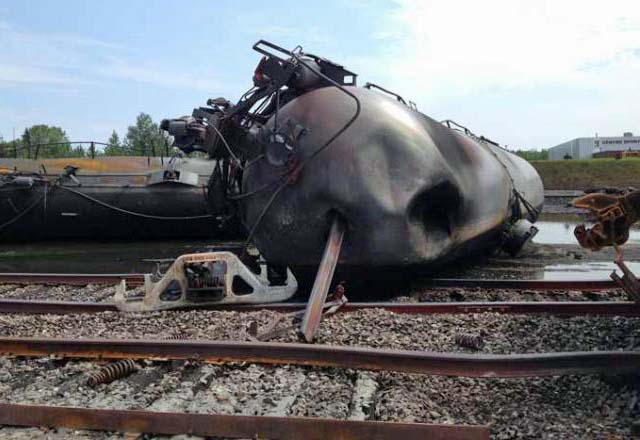

A portion of the damage following the Lake Megantic derailment - Date/Photographer unknown.
22 August 2013 Senate Seeks Railway Overhaul
in Wake of Lake Megantic Ottawa Ontario - A Senate committee study launched months before the fatal Lake Megantic train disaster urges the federal government to launch a major review of Canada's railway regulations, to better ensure the safe transport of dangerous goods.
The report released Thursday by the energy, environment, and natural resources committee contains 13 recommendations related to the transportation of crude oil and natural gas by railways, pipelines, and tankers.
Some of the key recommendations are: - The federal government should launch an arm's-length review of the railway regulatory framework, standards, and industry practices;
- Transport Canada should apply appropriate minimum liability coverage thresholds to ensure rail companies have the financial capacity to cover damages caused by a major incident;
- The National Energy Board and Transport Canada should create a web portal that includes interactive maps indicating detailed information on spills and incidents for pipelines, tankers, and rail cars. It should include the types of product released and the cause of the incident;
- The Transportation Safety Board should expand and modernize its database to provide detailed information on ship-sourced spills, including the type of ship, and the volume and type of product released.
The Senate report said the Lake Megantic train derailment that claimed at least 47 lives in early July underscored concerns many Canadians already had about transporting oil by rail. Those concerns are what prompted the study back in November, and led the committee to hear from more than 50 witnesses. The committee also did site visits across the country over the last nine months.
"The goal of our study was to examine the current state of emergency and spill prevention, preparedness, and response frameworks under federal authority and to make recommendations to improve public safety and the protection of the environment," Senator Richard Neufeld, chair of the committee, said in a news release.
Overhaul of Railway Regime Needed
"We've been working on these issues for the last nine months and the shocking Lake Megantic rail disaster has only intensified the need to address hydrocarbon transportation safety."
The report said the loss of life, property damage, and lasting environmental damage have convinced the committee that a major arm's-length review of the industry's safety regime is necessary.
"The committee believes the Lake Megantic tragedy could have the same impact on the rail industry as the 1989 Exxon Valdez spill has had on marine oil transportation. Namely, it resulted in significant changes in tanker design and a major overhaul of Canada's marine spill preparedness and response programs," it said.
The report said for the most part, oil and gas are transported safely in Canada, and that there are extensive regulatory frameworks and standards to promote safety. Senator Grant Mitchell, deputy chair of the committee, said at a news conference that Canadians can have confidence in the systems.
But he said that as long as society chooses to use oil and gas for energy, it will need to be transported.
Safety Culture Audits
"As long as they are transported, we can never say there will be zero risk," he said.
Senator Neufeld told the news conference that prior to the Lake Megantic disaster, the overall safety record of rail transport had been good and the report notes that derailments and accidents have decreased in the last decade.
"We would like to see that continue and never see another accident like we witnessed in Lake Megantic," he said.
Five of the recommendations in the report are related to rail safety, and one of them suggests that Transport Canada implement a set of recommendations that were made in 2011 by the environment commissioner. A lot of questions were raised in the wake of the Lake Megantic disaster about why those recommendations were not acted upon.
Another five recommendations are on tankers and two are on pipelines.
The committee said it heard from many witnesses during the 18 hearings about the importance of having a healthy safety culture and that employees on the front lines should be encouraged to question management on safety decisions.
The report recommends that Transport Canada and the National Energy Board do mandatory audits of the companies they regulate to ensure that they are in fact maintaining proper safety cultures.
"They all say that they're safe companies but what we need to do is set up systems to verify that," said Neufeld. "We need to make sure there are no further Lake Megantics."
The National Energy Board responded to the report with a statement that said it supports the committee's recommendations related to the regulation of pipelines. It noted that it hosted a safety forum in July to explore emerging issues in the oil and gas industries and that there was a lot of discussion about safety.
"A strong safety culture and well-implemented management systems provide additional layers of protection against catastrophic accidents. The NEB believes leadership is key to establishing, fostering, and instilling a healthy safety culture," the statement read.
Meagan Fitzpatrick.



Vancouver Island
British Columbia
Canada
| 

